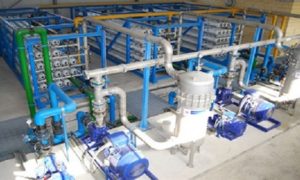By:
Tunisia, struggling with rising water pressures, has shifted to seawater desalination as a strategic response to its water challenges.
This approach, while promising, presents considerable challenges, but also offers significant opportunities for the future of water management in the country.
A response to water stress
Confronted with the continued increase in demand for water, resulting from population growth, urbanization and economic pressures, Tunisia discovers itself faced with an increasingly concerning situation of water stress. Conventional water resources, such as groundwater and rivers, are increasingly overwhelmed, while the impacts of climate change are felt through more frequent and intense periods of drought.
The National Water Exploitation and Distribution Company (Sonede) has executed a new strategy aimed at improving the quality of service and guaranteeing the supply of drinking water by resorting to the desalination of underground brackish water and ‘sea water.
Achievements and achievements
Currently, Tunisia operates several desalination stations, including the Djerba seawater desalination station, to meet the increasing demand for drinking water. Three seawater desalination plants are presently under construction in Gabès, Sfax and Sousse, which will come into operation at the end of 2024. Calls for tenders for the construction of four other stations in Tozeur, Kébili, Sidi Bouzid and Ben Guerdane will be launched soon.
To deal with this water crisis, voices have been raised, such as the Tunisian Forum for Economic and Social Rights (Ftdes), calling on the government to speed up the adoption of the water code to better manage the hydraulic resources of the country and ensure equitable access to water, highlighting the right to water as a fundamental right.
Therefore, seawater desalination in Tunisia represents a significant advance in the fight against water stress, offering a concrete solution to ensure an adequate supply of drinking water for the population and economic activities of the country.
Financial and technical challenges
Nevertheless, seawater desalination is not without its challenges. First of all, it is expensive. The infrastructure required to convert seawater into drinking water is complex and requires substantial investment, both for construction and long-term operation. Further, desalination requires a substantial amount of energy, which further increases its costs.
The cost of the seawater desalination plant in Tunisia varies depending on the specific projects. For example, the desalination plant project in Sfax, funded by Japan, has a cost of around 36.7 billion Japanese yen, equivalent to around 780 million Tunisian dinars. On the other hand, the cost of desalination of a cubic meter of water is estimated at 3.5 dinars in Sfax, Sousse and Zarat in Gabès.
The production capacity of seawater desalination stations in Tunisia ranges according to the projects:
- Zarat desalination station in Gabès will have a production capacity of 50,000 m3 per day, expandable to 100,000 m3 per day.
- The Sfax desalination plant will have a capacity of 100,000 m3 per day in the first phase, and 200,000 m3 per day in the second stage.
- The Sidi Abdelhamid desalination station in Sousse will be able to desalinate nearly 50,000 m3 of water per day.
So the production capacities of seawater desalination stations in Tunisia generally range between 50,000 m3 to 200,000 m3 per day, depending on the specific projects.
On a technical level, desalination likewise poses challenges. The process itself, whether thermal distillation or reverse osmosis, needs specialized expertise and advanced technologies. Also, the management of saline effluents produced during the desalination process represents a notable environmental challenge, requiring proper dilution or discharge strategies to minimize impacts on marine ecosystems.
Opportunities for the future
Despite these challenges, seawater desalination presents significant chances for the future of Tunisia. By investing in innovative technologies and effective management practices, the country can overcome the technical and financial obstacles associated with desalination. Similarly, by developing its capacities in this area, Tunisia can reinforce its long-term water security and decrease its dependence on conventional water resources, which are often vulnerable to external pressures and climate change.
Additionally, desalination likewise provides economic opportunities, boosting the water sector and creating jobs in areas such as engineering, construction and management of desalination facilities. In addition, by securing a more reliable water supply, desalination can promote the economic and social development of the country, supporting agricultural, industrial and tourist activities.
Seawater desalination represents both a challenge and an opportunity for Tunisia. By overcoming technical and financial hurdles, the country can harness the complete potential of this technology to ensure a safe and sustainable water supply for its citizens, while paving the way for a more resilient and prosperous future.
What's happening in Tunisia?
Subscribe to our Youtube channel for updates.















































